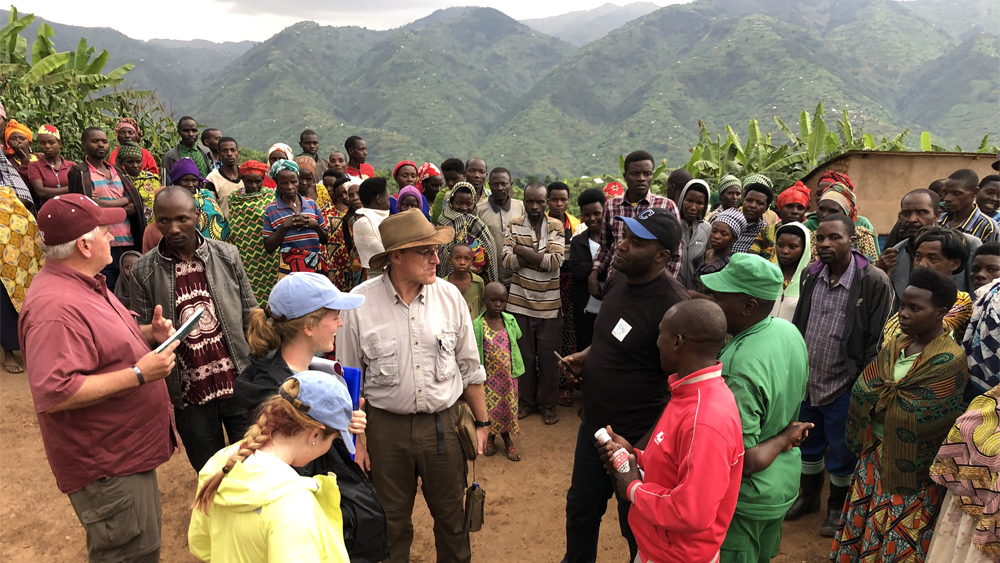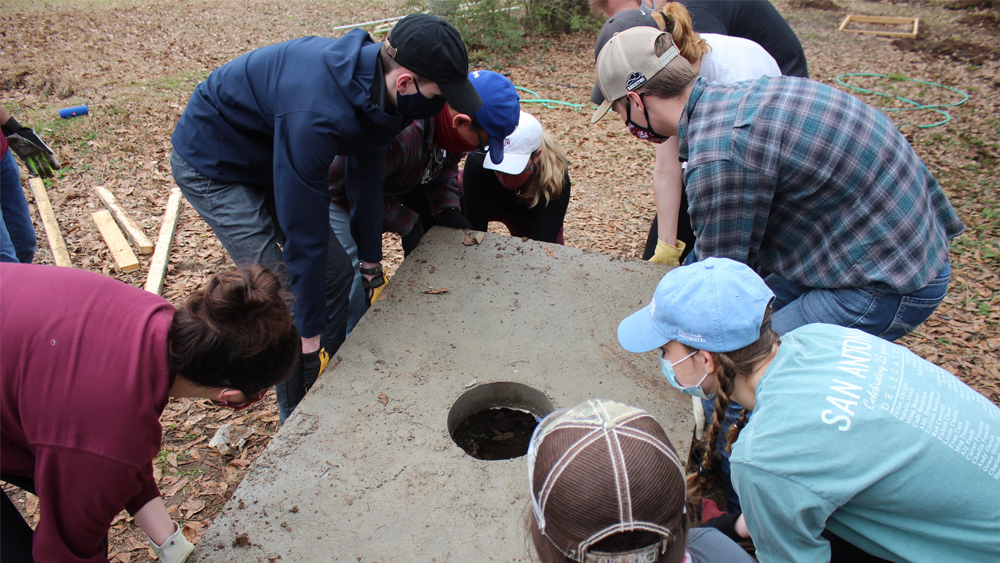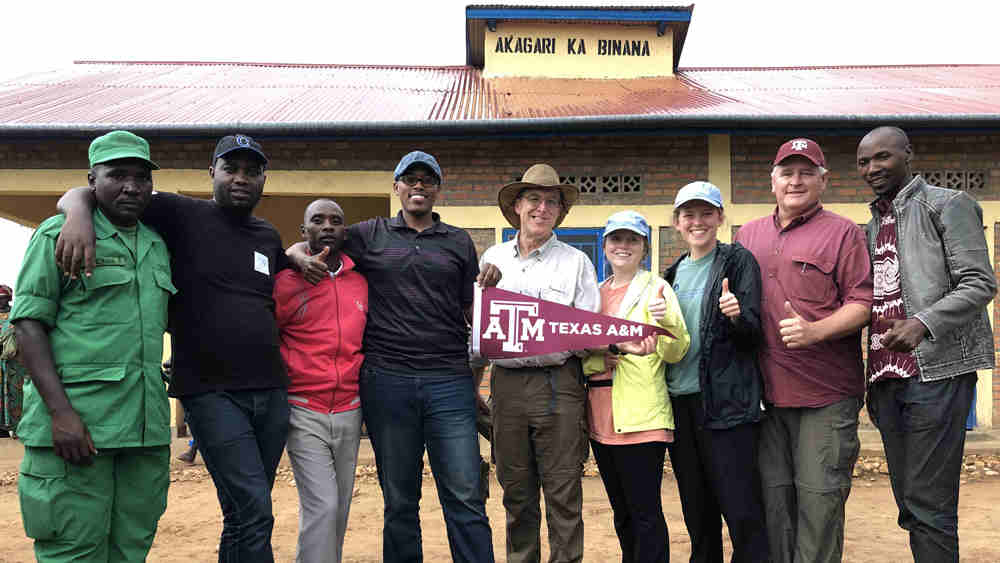
When the world shut down and travel abroad halted, the Texas A&M University chapter of Engineers Without Borders (EWB) had to change course.
The borders were closed on the trips they had planned to rural Matyazo, Rwanda, to implement a new design of latrines and to the village of Villa Verde in the Dominican Republic to develop solutions to mitigate flood damage to roads and infrastructure.
But that didn't stop this group of students. Despite the global pandemic, they continued to meet deadlines, build a sense of community within their organization and expand their reach. And, in a year where nothing went as planned, EWB was named the 2021 Registered Student Organization of the Year by Texas A&M.
"It is such an honor to be recognized as the organization of the year," said Ruby Ross, president of EWB and a biomedical engineering major from Bryan, Texas. "This award is a testament to the growth, perseverance and passion for service of each member of this organization. I am so honored to be a part of this organization that truly is without borders."
EWB planned assessment and implementation trips for the summer of 2020, but instead, project leads chose to focus on what was possible.
In Matyazo the team is designing and implementing latrines to help eliminate sanitation-related diseases and increase agricultural income for food security. EWB adopted the Rwanda project in November 2018 and made an initial assessment trip to Matyazo in January 2020.
"On the Rwanda team, members worked toward finalizing latrine and handwashing designs through sketches and prototyping workshops, as well as an implementation plan, to prepare for our first-ever virtual implementation in September," Ross said. "We quickly realized that our chapter's inability to travel to Rwanda did not inhibit the community's fervor to begin latrine construction."

EWB team members will guide the town through instructional materials and virtual communication by constructing one to two latrines ahead of a planned trip to Rwanda in January 2022.
"With the long-term goal of constructing 500 latrines within the community, the majority will be built remotely without us on site. We can then assess the success of our instructions/design, physically inspect the latrines and make design changes if needed when we visit them," said Eli Norris, Rwanda co-project lead and a junior materials science and engineering major. "One major aspect dictating our design is materials. The latrine will be built from 100% locally sourced materials and readily available tools. Many projects fail because they do not have the infrastructure/resources to order custom materials and tools. We are maximizing their involvement with the design to ensure they are comfortable with the latrine, and it will solve the problem. This is crucial to the long-term success of the project. We want them to be proud of the latrines they build."
The EWB team began a project in 2020 for Villa Verde, a diverse community with a significant drainage problem in the Dominican Republic. They are developing a road and drainage system to divert water that pools causing structural damage and breeds malaria-carrying mosquitos.
The team had planned to travel to Villa Verde in 2020 for an assessment trip, but when those plans were grounded, they pushed forward with the project from home, according to Vivi De Anda, a junior civil engineering major from Plano, Texas and Dominican co-project lead.
"We wanted them to know that we are dedicated to doing everything we can as we tackle this project during the pandemic," she said. "With the community, we were able to share ideas and questions from our team's work and research, which allowed us to continue brainstorming solutions together. These discussions have enabled us to learn more about them, their situation and work with them for the most effective solution. The ultimate goal is to help them become sustainable, sufficient and maintained by its members, which we can do by guiding and teaching them along the way."
This year, the Dominican Republic team continued data collection using Google Earth, online research and frequent community meetings to develop high, medium and low-cost options for roads and drainage on the Dominican team.
"My favorite aspect of Engineers Without Borders is our dedication to the long-term impact of each project. We recognize that communities in these third-world countries will often be given 'solutions' to their problems without any real training for or buy-in from their members who will have to maintain the solution in the years to come," Ross said. "This makes it difficult for the project to succeed. EWB takes a different approach, working alongside the community in three phases to assess the problem, implement the solution and monitor the project. We believe in equipping them with sustainable solutions that truly meet their needs."
While EWB's members focus most of their efforts abroad, they also strive to make an impact at home by participating in a park clean-up event sponsored by Keep Brazos Beautiful, Kyle Field Day and volunteering in The Big Event, the largest one-day student-run service project in the nation.
Ross, who joined EWB as a freshman, is excited to see the growth in the organization and the membership of the group, which has increased to more than 50.
"I think that the growth is attributed to EWB's unique focus on hands-on, international projects. In each of our projects, we get to know the people we're serving around the world. Through conversations and community visits, we learn more about the lives and culture of those we're serving," she said. "We also equip our members with the hard and soft skills to manage a large-scale budget successfully, build a composting latrine or lead a team of people miles apart. The list goes on and on. What makes EWB so unique is our dedication to equipping students with practical skills and using those skills to serve real people worldwide."

EWB's influence extends from personal to global impact. For Ross, De Anda and Norris, the impact has been huge.
"More than anything, it's taught me about looking for the potential in everything. Recognizing the potential in a new project or new leader and being part of the growth that follows is one of my greatest joys," Ross said. "For our members, EWB teaches the power of teamwork. I've always been amazed by the unique gifts that each person possesses and how they can harness those talents, alongside others, to do something greater than they could do on their own."
De Anda said she hopes to continue working with EWB long after her four years in college.
"I'd love to stay engaged, involved and in touch with the chapter and the community and see the incredible ways EWB can continue to make an impact through different projects. I'm honored and humbled by the opportunity to be able to serve others while applying the knowledge and skills I am acquiring through my classes and experiences," she said. "I am grateful to everyone in EWB for their passion, persistence and hard work to truly make a positive difference. Everyone brings their authentic gifts that benefit the team, and I've learned so much from each of them. This is a gratifying experience that has also helped me grow as a student, friend and individual."
As a freshman, Norris walked into a Rwanda project meeting not knowing what to expect but left knowing he had to be a part of it.
"Since that meeting, I have learned that EWB is truly without borders. We incorporate people from almost every engineering discipline and are expanding that to every major, from finance to graphic design; there is a place for anyone and everyone in EWB. I have never been a part of a more inclusive organization," he said. "Personally, EWB has pushed me to get out of my comfort zone and work hard for the benefit of others. As a materials science and engineering major, I don't take any classes related to the construction of buildings. EWB has granted me the ability and responsibility to learn about things from creating AutoCAD drawings to volcano-style concrete mixing. One of my favorite aspects about EWB is that we get to directly use the fundamental engineering principles taught in the classroom on real projects that impact real people. To me, that is a priceless college experience."
Discover more about EWB, their projects, leadership team and how to become involved.